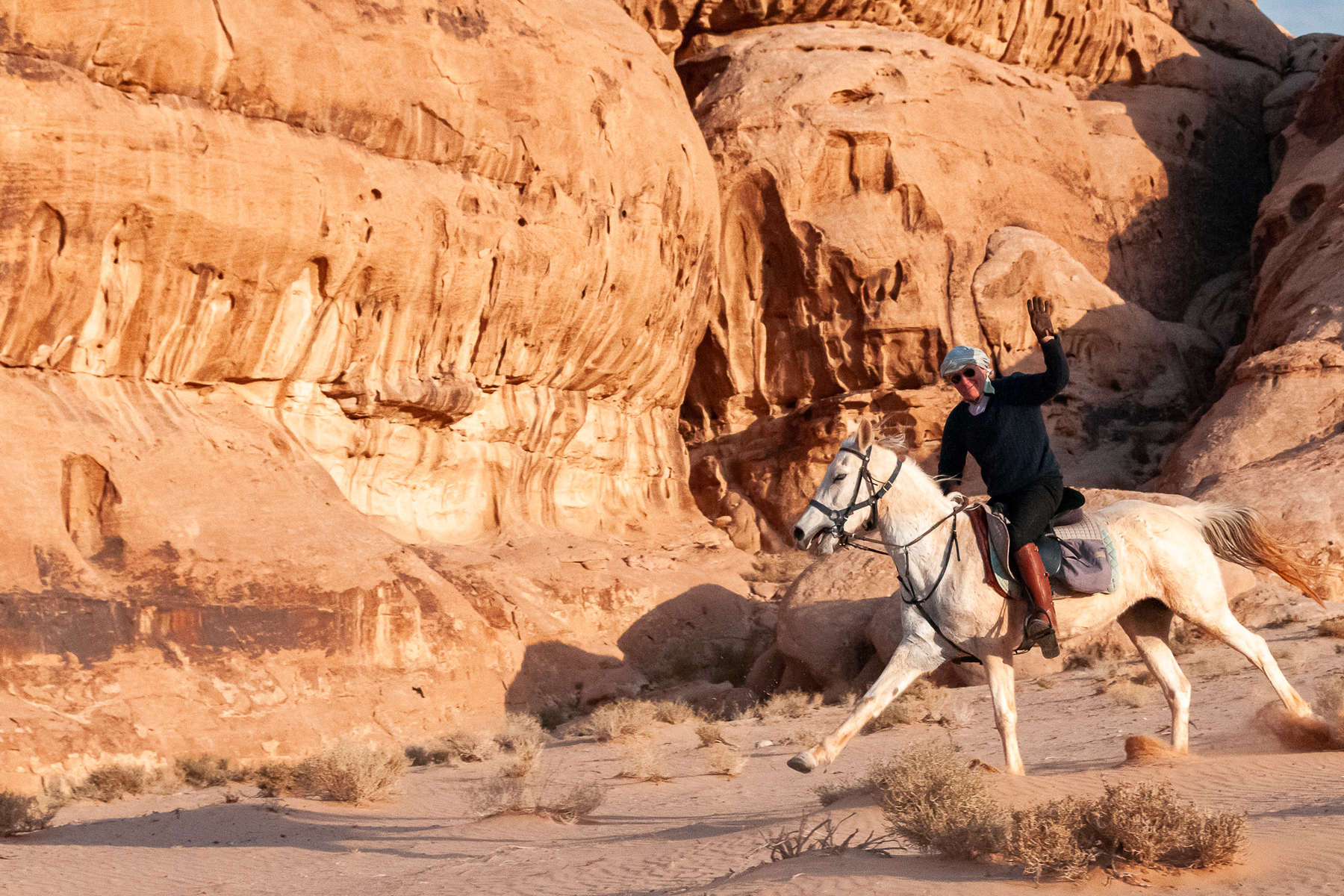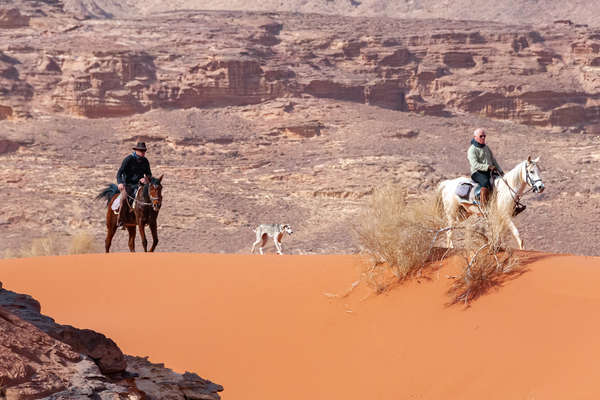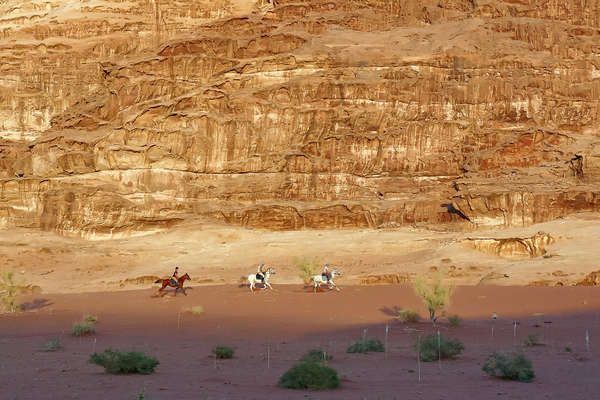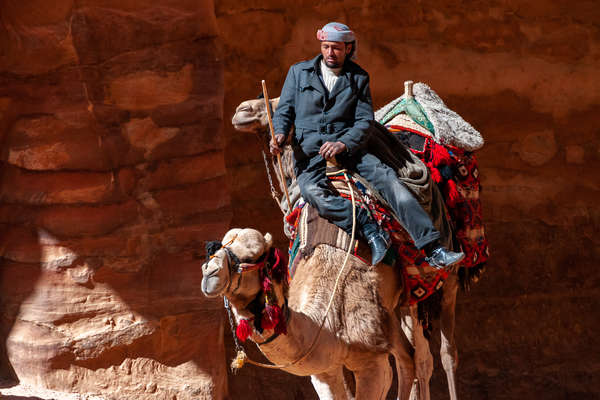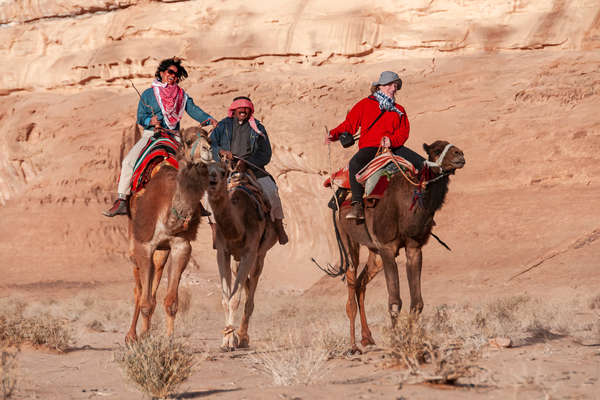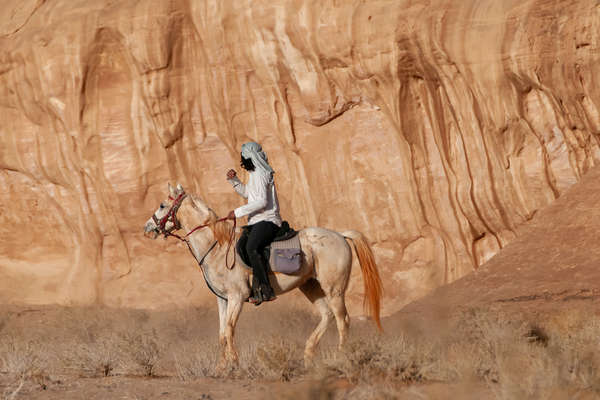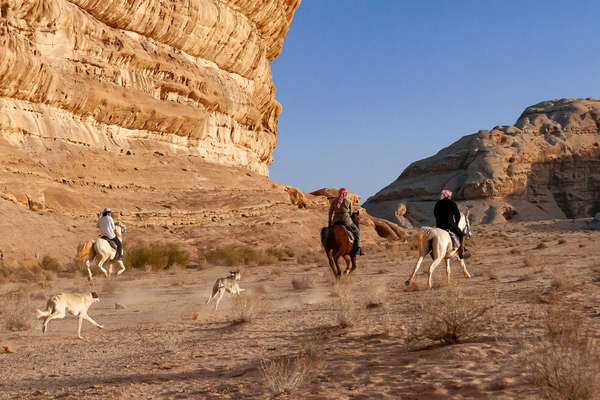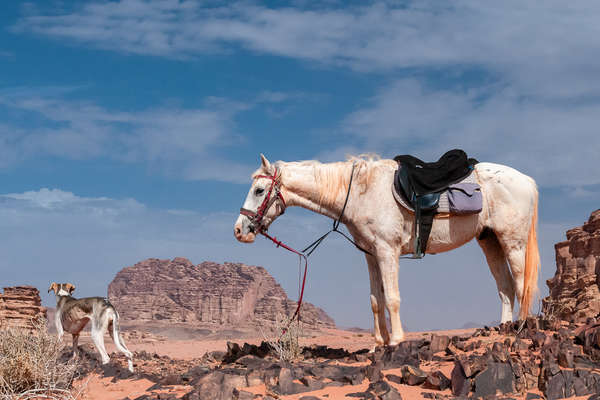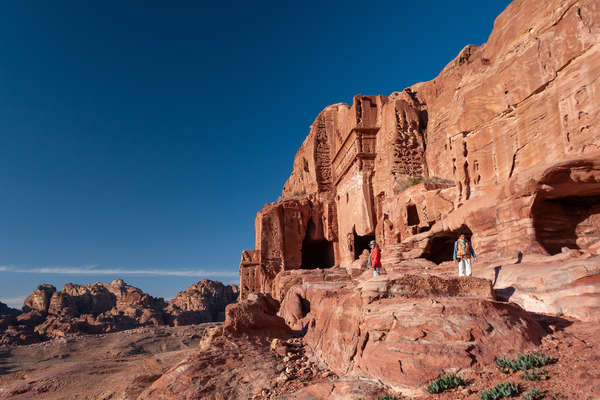Comfort
- 3* hotels (local standard) with twin or double rooms in Madaba and Petra.
- Camp is set up in a different location each night, carefully selected for the season and the beautiful landscape. There are two-person tents or if you wish you can sleep outside under the stars. Foam mattresses are provided but you need to bring your own sleeping bag. There are no showers and loo tent but a bucket of water is provided to wash up - please note water supplies are limited in the desert!
Meals
In the desert meals are created over an open fire or small gas stove. The meals are typically Jordanian with western influences. Chicken and mutton are popular and there is often rice.
Mineral water is provided throughout the ride as well as tea, which is often served sweetened without milk, although you can ask for it to be less sweet. Alcohol is not provided and is not consumed by your guiding team but it is usually available in the hotels and so you can buy it if you wish. Bringing alcohol to the ride in the desert is not recommended for cultural reasons.
Climate
Jordan has a desert climate, with predominantly hot temperatures and little rain, but there are some seasonal and regional differences. Winter is short and usually December - February. At this time there can be rain and some cold winds. Temperatures can hover around 7c but there can be some pleasantly warm days too.
Petra:
Situated in the mountains, the winters can be cold - c. 14c during the day, dropping to zero at night. There have even been reports of snow in Petra. In Spring and Autumn the temperatures are more pleasant, with daytimes 24-27c and nights 10-12c. Summer can be very hot (35c).
Wadi Rum:
Winter can be cold, with daytime temperatures of 13-14c and nights of minus 1. Spring and Autumn temperatures are usually 24-27c during the day, dropping to 10-12c at night. The summers are very hot (40c) and there is no riding.
Tips
It is customary to tip the local team and we would recommend c. £40 for the ride, but you must give what you feel is appropriate.
Packing list
Head
- Helmets are mandatory and not provided
- Sunhat for when not riding
- Sunglasses - with a cord attached so they don't fly off when riding
- Buff or bandana
Upper body
- Long sleeved shirts provide protection from the sun and dust
- T-shirts
- Fleece, jumper or jacket - the evenings can be cold
- Waterproof jacket - the rains can be difficult to foresee and it's better to be prepared. Layering is key to cope with the fluctuations in temperature between day and night
- Casual clothes for the evening
Legs
- Lightweight, comfortable riding trousers or jodhpurs - we recommend riding in them at home before taking them on holiday to ensure they don't rub
- Shorts for lazy lunchtimes
- Casual clothes for the evening
Hands and Feet
- Comfortable riding boots. We recommend short boots with half chaps as long chaps/long boots can get very hot.
- Sandals, flip-flops or trainers for moving around the camp
- Gloves - your hands are particularly exposed to the sun whilst riding
Nightwear
- Thermals are a good option for sleeping in, or a t-shirt and shorts for warmer nights
- A woolly hat when camping (desert nights can be cold)
- Sleeping bag - we recommend a comfort factor of 2-5c. We also recommend taking a silk or fleece liner for an extra layer
Other useful items
- Swimsuit for the Dead Sea
- Towel. Camping towels will pack lighter and dry more easily
- Sarong (for going to/from the shower tent)
- Water bottle(s) - max size 1 litre
- Hand sanitiser
- Wet wipes or washcloth
- Camera and high capacity memory card. Spare battery
- Bumbag for carrying your camera and small items whilst riding
- Headtorch or small torch for moving around camp at night
- Toilet paper and small plastic bags for taking rubbish away
Medical kit
- Sunscreen and lip balm - must be high factor
- Insect repellent
- Any medication you regularly take
- Blister plasters in case of any rubs
- Antiseptic cream, plasters, aspirin, anti-histamine, insect-bite salve etc...
- Rehydration sachets (dioralyte or similar)
- Spare prescription glasses/contact lenses
- Ear plugs, particularly if you are a light sleeper
Protect the environment! We recommend you bring your own camping plate, glass and cutlery to help our local team cut down on plastic waste.
Our Recommendations
- Please don't take a hard sided suitcase. Your luggage should be soft sided and you should pack it into two bags if it weighs more than 15kg so it's easier for the team to transport between camps
- Take a second, smaller bag to pack things you may need during the day such as a book or suncream then you can easily access it during the long lunch break
- We recommend travelling in your riding boots and carrying your hat and some riding clothes in your hand luggage - then if your luggage goes astray you are still able to ride!
- Carry a copy of your passport and insurance with you.

